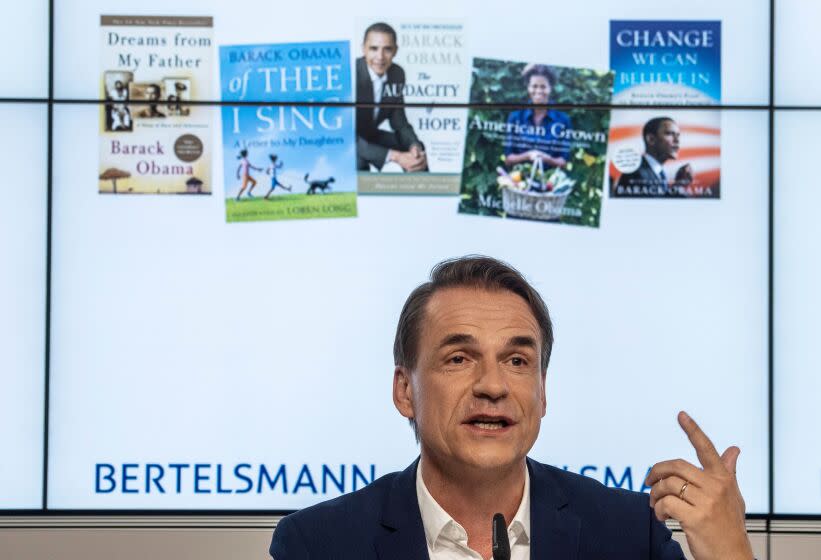Judge blocks Penguin Random House takeover of Simon & Schuster

A federal judge has blocked Penguin Random House's attempt to swallow its smaller rival Simon & Schuster, dealing a blow to the world's largest book publisher's attempt to become an even bigger giant.
Late Monday, U.S. District Judge Florence Y. Pan ruled the government had succeeded in its case by demonstrating that the proposed merger would have antitrust implications by being likely to "substantially" lessen competition "in the market for the U.S. publishing rights to anticipated top-selling books."
Pan's ruling hands the Biden administration a decisive victory as it weighs whether to challenge other industry-shaping mergers.
The consolidation between the two book publishing houses would have drastically altered the industry by trimming the number of major publishing houses, known as the Big Five, to just four.
The case had been closely watched — it was the biggest antitrust trial in the publishing world in decades.
Economist Nicholas Hill, who appeared as an expert witness for the government during its August anti-trust trial, testified that Penguin Random House combined with Simon & Schuster would command a 49% market share, more than double that of the next largest competitor, HarperCollins, owned by News Corp., which has 22%.
Other government witnesses who testified included legendary author Stephen King. The bestselling writer of “The Shining," “The Stand” and "Pet Sematary" was publicly critical of the deal and the involvement of his longtime publisher, Simon & Schuster.
He recalled that back when he started writing books, in the 1970s, there were hundreds of imprints. But no longer.
"Consolidation is bad for competition,” King said during the trial. "That’s my understanding of the book business. The more companies there are, the better it is.”
Assistant Atty. Gen. Jonathan Kanter of the Justice Department’s Antitrust Division applauded Pan's ruling.
“Today’s decision protects vital competition for books and is a victory for authors, readers, and the free exchange of ideas,” Kanter said in a statement. "The proposed merger would have reduced competition, decreased author compensation, diminished the breadth, depth, and diversity of our stories and ideas, and ultimately impoverished our democracy.”
In her order, Pan did not detail her rationale for blocking the merger.
Instead, she filed a memorandum outlining her decision under seal because it contained sensitive business information. The judge gave both sides a chance to object to making public some of the information. Lawyers have until Friday to meet and confer and jointly file proposed redactions of "confidential" and "highly confidential" information contained in the judge's memo.
Penguin Random House said it would immediately request an appeal of Pan's ruling.
"We strongly disagree with today’s decision, which is an unfortunate setback for readers and authors," Penguin Random House said in a statement. "As we demonstrated throughout the trial, the Department of Justice’s focus on advances to the world’s best-paid authors instead of consumers or the intense competitiveness in the publishing sector runs contrary to its mission to ensure fair competition. We believe this merger will be pro-competitive, and we will continue to work closely with Paramount and Simon & Schuster on next steps."
Simon & Schuster's Chief Executive Jonathan Karp expressed his disappointment in an email to employees.
"We are reviewing the decision and discussing next steps with Paramount, Bertelsmann and Penguin Random House," Karp wrote. "Meanwhile, we should and will remain, as we always have and no matter the circumstance, single-mindedly focused on our shared purpose of being a world-class publisher."
The decision dealt Simon & Schuster's parent company, Paramount Global, a setback in its efforts to raise money by shedding iconic CBS-controlled assets. The company had hoped to complete the merger a year ago before running into the regulatory headwinds.
Previously known as ViacomCBS, Paramount put the storied publishing house on the auction block in early 2020, just months after the merger of Viacom and CBS. The company received several offers for Simon & Schuster, including from another rival, HarperCollins.
But ViacomCBS selected the $2.18-billion bid from Bertelsmann’s Penguin Random House, even though some observers warned there could be regulatory ramifications. (ViacomCBS said then that the German conglomerate Bertelsmann had agreed to pay a termination fee if regulators were to block the deal, but the company did not disclose the size of the fee.)
The deal stunned the industry, and authors voiced their concerns about the merger's potentially negative effects. The Authors Guild pleaded with the Justice Department to intervene to stop the merger.
The guild's president, Doug Preston, lauded the new ruling Tuesday in a statement, calling it "a major victory for authors."
"This is the first time a court has recognized what authors and the Authors Guild have been arguing for decades — that a consolidation among publishers hurts authors," Preston said. "It leaves authors with fewer potential buyers of their manuscripts, which restrains their power to negotiate advances and other terms."
The publishing industry has seen accelerating consolidation over the last decade as book houses look to gain bargaining muscle when going up against online retailers, especially Amazon.com. In 2016, Hachette Book Group bought Perseus Books. Rupert Murdoch's News Corp., which owns HarperCollins, bought romance novel publisher Harlequin in 2014, a year after Penguin and Random House came together in another blockbuster combination.
Critics of such deals have long worried that bigger behemoths in publishing wield increasing power over authors. Having previously done little to step in, the government under the Biden administration signaled a more aggressive antitrust stance, and last year the Justice Department followed through.
Kanter's statement Tuesday put the suit in context of its more general shift in priorities. "The decision is also a victory for workers more broadly,” the Assistant Attorney General said. “It reaffirms that the antitrust laws protect competition for the acquisition of goods and services from workers."
Times staff writers Dorany Pineda and Freddy Brewster contributed to this report.
This story originally appeared in Los Angeles Times.

